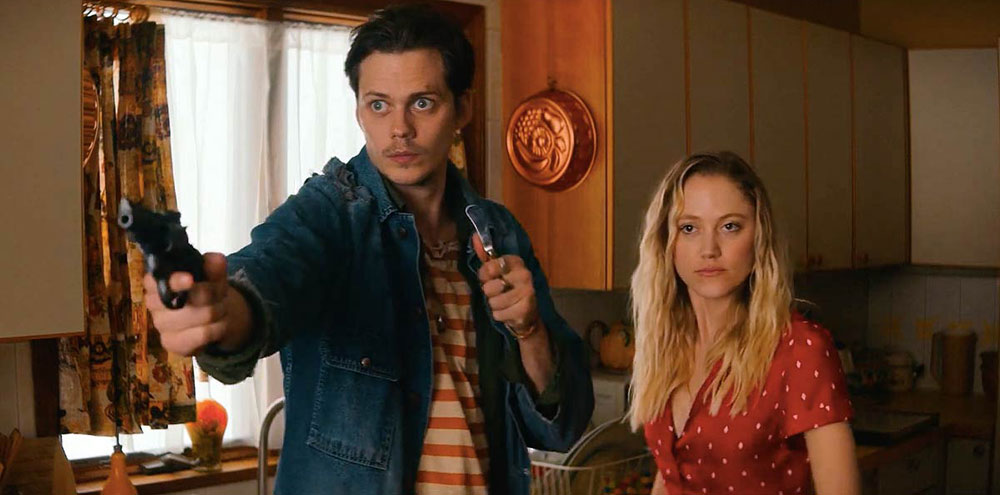
“Mickey and Jules are lovers on the run, headed southbound for a fresh start in the Sunshine State. When their car dies after a gas station robbery, they break into a nearby house looking for a new set of wheels. What they find instead is a dark secret, and a sweet-as-pie pair of homeowners who will do anything to keep it from getting out.”
While it might not stick the landing, the rest of the picture leading up to the ending of Dan Berk and Robert Olsen’s Villains is a delightful run. The duo co-wrote and co-directed this film and do an awful lot with the bare minimum. With the exception of an opening scene in a convenience store and a shot right before the closing credits, the pair set everything in and around one house, with four actors taking up the majority of screen time. It’s quite impressive how big Villains feels when it could have easily been a claustrophobic trap.

A lot of that is due to the main cast. Bill Skarsgård and Maika Monroe play Mickey and Jules, respectively, and Jeffrey Donovan and Kyra Sedgwick play homeowners George and Gloria, and each pair has their own unique dynamics; while quirkily different, each pairing represents a happy, loving couple. One might rob convenience stores, while the other keeps a child chained up in their basement, but there are reasons for both, involving hopes and dreams for the future.
The whole thing’s rather charming, despite the inherent flaws in plans which rely on various levels of law-breaking in order to achieve lasting connubial bliss. Donovan’s performance as George draws from his confident portrayal of Michael Weston on the series Burn Notice, while also paralleling Dylan McDermott’s work as Don Burnside in last year’s The Clovehitch Killer. There’s a quiet front which hides a brutally menacing character we’re only ever given glimpses of, and while he might seem glibly confident, it’s not without merit, especially on lines such as, “Son, I’d blow your brains out if I thought you had any.”
George’s interactions with Mickey comprise the majority of Villains‘ screen time, and that means that Sedgwick and Monroe kind of take the backseat. Monroe’s comedic chops are something I didn’t expect at all, after so many films where she plays a somewhat sad young woman. She’s so positive, here, and her delivery kills every time she gets a juicy line.

“Are you guys going to kill us or what’s the deal?” hits so perfectly deadpan, I might’ve cackled out loud. Sedgwick is by turns sultry and sad, and while she’s not given a lot to work with, other than the occasional morose turn, the absolute highlight of the film is an interaction between her and Monroe while they eat dinner. It’s the kind of showdown which really demonstrates that more time between the two women might’ve balanced out the male pairing.
The score is absolutely spot-on, and I couldn’t quite put my finger on what made composer Andrew Hewitt’s mix of horrific intensity and comedic whimsy so familiar, but an IMDB visit pointed out that he’d done the score for the British cult series Garth Marenghi’s Darkplace. While Villains is by no means that level of slapstick absurdity, the heightened reality of Berk and Olsen’s film is well-served by Hewitt’s score.
Back to that complaint about the ending: Villains allows the reality to get weirder, and the absurdity to grow ever-so-slightly in each scene (I’ve never seen a film in which cocaine is portrayed so positively) that the ending, which is fairly standard, comes as a bit of a let down. It’s a minor letdown, to be sure, but coming off a madcap back half, with an honest-to-god, WWE-level snail race, Villains ends on a more maudlin and sentimental note than might’ve otherwise been promised.




